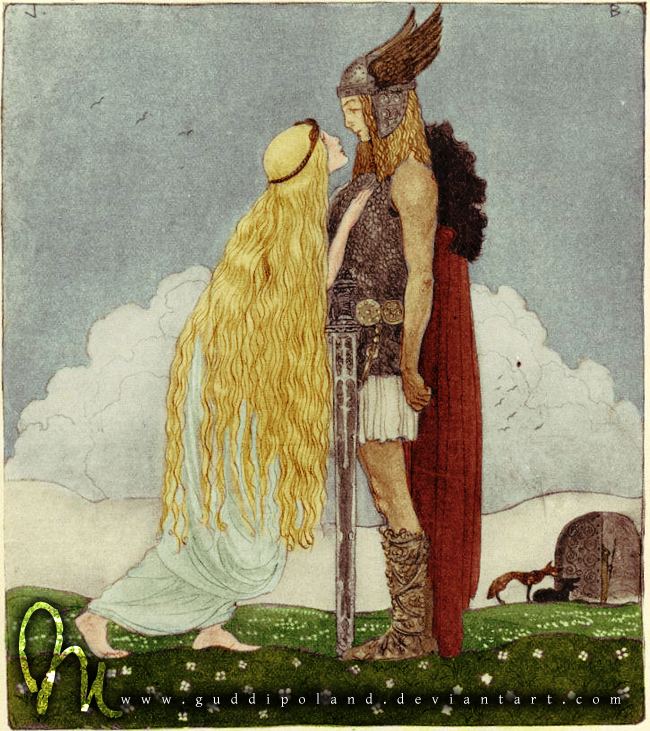A Study Guide
HOME
Gróugaldur and Fjölsvinnsmál
The Unity of the Two Poems
Although Svend Grundtvig and Sophus Bugge (1856) are generally credited with discovering that the two poems belong together, as the beginning and end of a single story, Frederich David Gräter in 1830 had long since drawn the same conclusion:
Frederich David GräterVersuch einer Einleitung in die Nordische Alterthumskunde
Volume 1
| Etwas jünger
als diese scheinen Grougalldur, Fiölsvinnsmaal und Hyndluliod zu
seyn. Grougalldur ist zwar nicht zum ersten Theil der poetischen Edda gezahlt, und auch unter obigen 14. nicht mit berechnet. Allein schon Rask in der Stockholmer Ausgabe rückt dieses Lied über Fiölswinsmaal vor, und Magnusson (s. Den Æeldre Edda, III. 176. und IV. 258.) lehnt es keineswegs ab, daß der Ausdruck in der 3ten Strofe: móti menglauþum oder menglöðom, den Menglöden entgegen, wenn gleich Plural, und dem Anschein nach blos als allgemeines weibliches Appellativ genommen, doch auf eben diese Menglöd oder Menglade, deren Burgvogt Fiölswinn ist, und welcher daher, mit ihrem, von langen Reisen zurückkehrenden Verlobten, Swipdag, ins Zweigespräch kommt (daher eben das Lied Fiölswinns-Maal heißt) Bezug haben könne. Schon das Wort men-glóð an sich, da es in keinem andern oder früheren Eddischen Liede vorkommt, soviel ich weiß, scheint auf gleichzeitige Abfassung hinzudeuten. |
Gróugaldur, Fjölsvinnsmál and Hyndluljóð appear to be slightly younger than these.
Gróugaldur is certainly not reckoned in the first part of the Poetic Edda, and also not counted among the 14 mentioned above. Rask in the Stockholm edition only includes the song about Fjölsvinnsmál, and Magnússon (see Æeldre Edda, III, 176 and IV 258) accepts that the expression in the 3rd stanza móti menglauþum or menglöðom, (as opposed to Menglöden) even though plural and appearing to be used merely as a general female appellative, could only have reference to this Menglöd or Menglade whose guardian is Fiölsvinn, who himself engages in verbal exchanges with her fiancé Svipdag, returning from long voyages. (Hence the song is named Fjölsvinnsmál). Even the word men-glod, since it is not found in any other or earlier Eddic songs that I know of, seems to point to a simultaneous composition. |
| Genug, der Inhalt von Grougalldur oder Groa's Zauberlied ist
folgender: |
Enough, the contents of Gróugaldur or Groa's Magic song are as follows: |
| Die Zauberin Groa liegt im Grabe. Kurz, ehe sie starb, scheint es, hatte sie ihrem Sohne Swipdag befohlen, in weiter Ferne um eine reiche und vornehme Jungfrau, Menglöd oder Menglade zu freyen. Allein wo er sie finden, und welchen Weg er einschlagen, und auf welche Art er die Gefahren der Reise beseitigen könne? das sagte sie ihm nicht mehr, darüber hatte sie der Tod überrascht. Er kommt also zu ihrem Grabe, und beschwört sie, ihm Antwort zu geben. Die Mutter erwacht aus dem Todesschlafe, und singt ihm ein Zauberlied, in welchem alle Gefahren theils mystisch, theils mythisch, theils physisch gezeigt werden, die ihm auf seiner Fahrt begegnen können, schließt aber damit, daß er allen diesen Gefahren trotzen soll, und weissagt ihm noch am Ende das höchste Erdenglück, falls er ihrer Worte eingedenk sen. | The sorceress Groa lays in a grave. Shortly before she died, it seems, she had commanded her son Svipdag to free a rich and noble virgin, Menglöd or Menglade, far away. Only where can he find her and what path he should take, and by what means he can eliminate the dangers of the journey? She says nothing more to him concerning her death. He thus comes to her grave, and she promises to respond. Awakened from the sleep of death, his mother sings him a magic song, in which all hazards that will meet him on his journey—some mystical, some mythical, and some physical— are mentioned , but concludes that he can brave all these dangers, and she predicts that he will end up attaining the highest earthly happiness, if he just remains mindful of her words. |
| Jetzt sollte allerdings ein Zwischengesung kommen, Swipdags-for oder Swipdags Reise und Abenteuer, nebst seiner Verlobung mit Mengladen. Ein solcher aber hat entweder nie bestanden, oder er ist verloren gegangen. | Now should come an intermediate song, "Swivdags-för" or Swipdag's journey and adventure, along with his engagement to Mengladen. But such a song has either never existed or it has been lost. |
| Fiölswinnsmaal zeigt unsern Swipdag vielmehr schon vor den Mauern ihrer Burg, nachdem er, der Sitte unsrer alten Freyer gemäß, erst zum Beweis seiner Liebe auf Abenteuer ausgezogen, und nun eben zurückgekommen war. |
Rather Fjölsvinnsmál shows our Svipdag already standing before the walls of her castle after
going out on an adventure to prove his love (the custom according to
our old Frey) and only just now returning.
|
| Der Burgvogt Fjölsvinn stellt ihn mit verschiedenen Fragen auf die Probe, und ein Gleiches thut Swipdag. Endlich wagt dieser sogar die Frage, wer der Glückliche sty, dem das Burgfräulem werde zugetheilt werden. Swivdag heiße er, sagt her Burgvogt. — Nun so, füllt Swivdag ein, | The guardian Fjölsvinn asks him various questions about the test, and Svipdag does likewise. Finally he even dares to ask who the lucky one is, to whom the lady of the castle will be given. Svipdag is his name, says her guardian. Only then, does Svipdag confess: |
|
Riegel auf die
Thür! |
Unbar the door!
|
| Menglade war treu geblieben, | Menglade had remained true, |
|
Lang saß ich
(singt sie) |
I
sat long (she sings) |
 |
by John Bauer (1907)
Colorized by Guddipoland
HOME